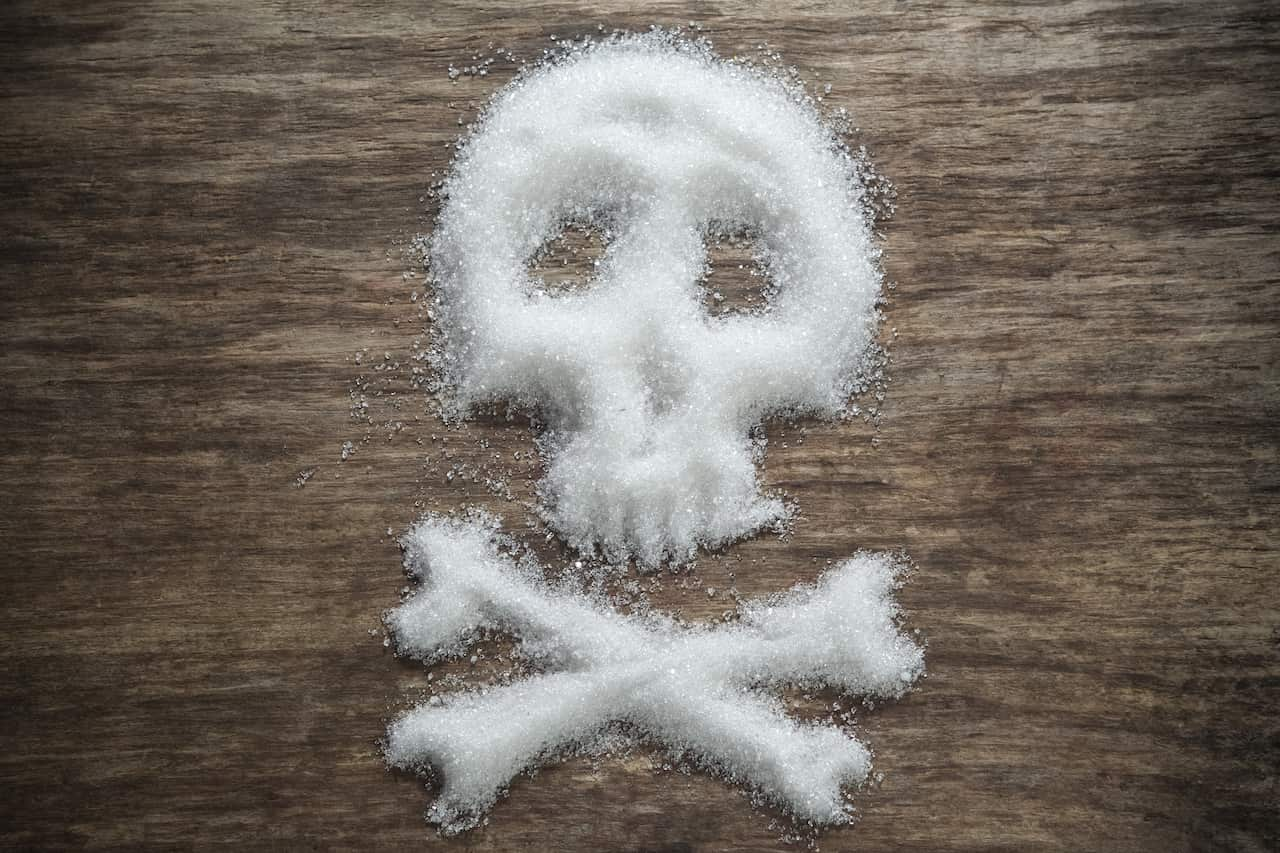By now, most people know too much sugar is bad for you. But with sugar hidden in so much of the food we buy, it can very easily slip unnoticed into the diets of both adults and children..
According to the Australian Bureau of Statistics, Australians consume an average of 14 teaspoons of sugar a day - well beyond the limit recommended by the World Health Organisation, which is six teaspoons for adults, and even less for children.
In the documentary Sugar Crash, obesity expert Dr Eva Orsmond takes a look at the latest research on serious health problems and their link to excessive sugar use, and why experts are calling added sugar public enemy No. 1 in the western diet.
"Unless we do something dramatic, the children of today may be the first generation in centuries to have shorter lifespans than their parents," says Dr Orsmond.
We've grabbed some of the most interesting - and worrying - facts from the documentary.
Sugar Crash airs 8.30pm Thursday August 24 on SBS.
How much sugar is ok?
The World Health Organisation recommends adults consume less than 25g or 6 teaspoons of added sugar a day for optimal health benefits (there is about 4 grams of sugar in one teaspoon). Children should have even less. A four year old should have less than three teaspoons of sugar a day, while under the age of two, kids should have no added sugar. An average 330ml can of sweet fizzy drink can have between nine and 11 teaspoons of sugar in it - well over the daily quota of sugar for an adult in one drink.
What happens to sugar in your body?
When you eat refined sugar, it is broken down in your small intestine into two molecules, one is called glucose and the other is fructose, and fructose is the sweet molecule that we crave. Your pancreas releases insulin, which brings the glucose to cells in your body where it is used it as fuel. Meanwhile, fructose goes to your liver, where it can be metabolised into energy. But there is a limit to how much sugar the liver can metabolise. If you go over that limit and the liver can't process all that energy, it has no choice but to turn that excess into liver fat. The build-up of fat in liver cells is called non-alcoholic fatty liver disease and it can lead to cirrhosis, liver cancer and liver failure.

Sugar is addictive, like a drug
"For tolerance and dependence, sugar meets the qualification for addiction hands down," Dr Robert Lustig, from the department of paediatrics at the University of California, says in the documentary. When you eat certain foods a message is sent to your brain and a chemical called dopamine is released which gives you a pleasurable feeling and so you want food again. When you eat sugar the chemical reward is particularly powerful. It does the same biochemical thing in the brain that all the drugs of abuse do.
Beware, there's sugar hidden everywhere
Sugar is added to all kinds of food you may not expect, including savoury items like pizzas, chips, tomato sauce and tinned soup. In fact, nutritional therapist Elsa Jones tells the documentary it's estimated that 75 per cent of all foods in the supermarket have sugar added to them. There are more than 50 different names to describe forms of sugar - including corn syrup, crystalline fructose, evaporated cane juice, diastatic malt, carob syrup, treacle, refiner's syrup, maltose, dextran, high-fructose corn syrup, galactose - so checking the list of ingredients on a grocery item can be a tricky business.
Sugar is "the alcohol of the child"
According to Dr Lustig, sugar meets all the same criteria as alcohol. "Alcohol is an energy source, but it is not a nutrient," he says. "There is no biochemical reaction in the body that requires alcohol. When consumed in excess alcohol does damage to your body. We keep alcohol out of the hands of children but we don't think twice about giving them a glass of soda or orange juice. Children are getting the disease of alcohol without alcohol, because sugar is the alcohol of the child."

Fruit-sweetened foods are no better
Many parents see fruit-sweetened foods and drinks as healthy, but they are not the same as fruit. When you extract or concentrate fruit sugars they are counted as added sugars. They have the same effect on health as any other sugar. Fruit juices and smoothies are often seen as a healthier option, but a smoothie can have seven or eight teaspoons of sugar in it. Liquid sugar in drinks dumps glucose and fructose very quickly to your stomach and intestine, and lots of insulin is needed to send that glucose to your cells. Insulin is also needed to help your liver metabolise fructose. When the pancreas can no longer make sufficient insulin, or the body can't respond to insulin normally, you can develop type 2 diabetes.
Sugar is still dangerous, even if you're not overweight
Obesity worldwide has more than doubled since 1980, says Dr Orsmond. In 2013, 42 million children under the age of 5 were overweight or obese. For the first time, obesity is killing more people than famine. But even if you are not overweight a high-sugar diet can damage your heart. The arteries connected to your heart become narrowed or hardened, and this restricts oxygen. Damaged blood vessels are vulnerable to clots which can cause heart attacks or a stroke. "We now know that sugar is linked to increasing blood pressure, but also very strongly linked to developing type 2 diabetes," says cardiologist Dr Aseem Malhotra. "And those are the two of the major risk factors for heart disease. People who consume more than 25 per cent of their calories from sugar have triple the rate of cardiovascular mortality, compared to people consuming less than 10 per cent, and that was even in non-obese people."
A high sugar diet mimics anxiety in the body
"Anxiety releases enormous quantities of sugar for energy," says says Professor William O'Connor, from the University of Limerick Graduate Entry Medical School. "So if you're afraid, sugar is released in the body in order for you to run away or to take action. But if you're taking high energy food, that high energy sugar is already in the blood, so you get a simulation of anxiety. We now think that depression in adolescents may at least partially be explained by their high intake of sugar." Your mood, memory and even your personality can be affected by your sugar habit. "We know that people with type 2 diabetes have double the risk of Alzheimers disease, we know that people will age quicker, and mental activity will decrease." Inconsistent blood-sugar levels in the brain affect different areas, such as the pre-frontal cortex where you can get problems with your ability to think.
The relationship we develop with sugar as a child can last a lifetime
Even when we're babies in the womb, we're being influenced by the food choices of our mother. "We can actually transmit our food tastes to the next generation," says Professor O'Connor. "[The mother] is predisposing the child to eat the same food. As a preference later on, they will prefer the same food." The message is, if you get hooked on sweet at a young age you will always want sweeter and sweeter.
Watch Sugar Crash Thursday August 24 at 8.30pm then on SBS On Demand.
SBS Food is a 24/7 foodie channel for all Australians, with a focus on simple, authentic and everyday food inspiration from cultures everywhere. NSW stream only. Read more about SBS Food
Have a story or comment? Contact Us

